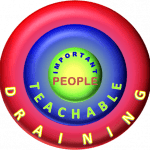How Full Is Your Bucket?
The subject line is the title of a book by Dr. Don Clifton and Tom Rath. Before becoming the Chairman of Gallup Dr. Clifton was an educational psychologist and the creator of the world renowned Clifton StrengthsFinder survey. Dr.Clifton had a simple theory which he used to help millions around the world impact their productivity and wellbeing, “The Theory of the Dipper and the Bucket.” Page 15 of this book records it this way:
“Each of us has an invisible bucket. It is constantly emptied or filled, depending on what others say or do to us. When our bucket is full, we feel great. When it’s empty, we feel awful.
Each of us also has an invisible dipper. When we use that dipper to fill other people’s buckets — by saying or doing things to increase their positive emotions — we also fill our own bucket. But when we use that dipper to dip from others’ buckets — by saying or doing things that decrease their positive emotions — we diminish ourselves.
Like the cup that runneth over, a full bucket gives us a positive outlook and renewed energy. Every drop in that bucket makes us stronger and more optimistic.
But an empty bucket poisons our outlook, saps our energy, and undermines our will. That’s why every time someone dips from our bucket, it hurts.
So we face a choice every moment of every day: We can fill one another’s buckets, or we can dip from them. It’s an important choice — one that profoundly influences our relationships, productivity, health, and happiness.”
On any given day each of us has hundreds of conversations and interactions. In each of these how do you use your dipper? When I think of this I must confess that I am more prone to use my dipper to empty buckets. You see, from our early upbringing we have been trained to focus on the negative and to look for mistakes and shortcomings.
The Gallup organization surveyed parents with the following question: ‘Your child’s report card has English A, Social Studies A, Biology C, Algebra F, Which subject deserves your most attention?” 83% of respondents in Canada and 77% of respondents in the US said they would focus on the F.
A study by Dr. Elizabeth Hurlock found that students who received praise for correct answers had a 71% improvement in following test scores. Children who were criticized and corrected for their mistakes experienced only a 19% improvement.
The impact is not limited to children. Research suggests that even adults need as much as five positive feedback comments to wipe the negative impact of one harsh criticism. Did you know that having a bad negative boss increases the risk of stroke by 35%? Negative feedback impacts personal and corporate productivity. The Gallup team suggests that the negative impact is not only disheartening but also it is expensive. It costs the US economy $250 to $300 billion a year in lost productivity.
Read the morning paper, watch the evening news, or talk with colleagues at the water cooler and you will quickly see that we live in a world that is often focused on the negative. The results are often compromised wellbeing and personal productivity. Do not underestimate your impact on others. Your positive feedback can impact your world for good. In return your own bucket will be filled.
What can you do?
- Your words have power. When you must correct or criticize someone, present your concerns or opinion as a question not as a statement of criticism. Your wise questions can help them search for a more positive option.
- Join me in my commitment to become more of “bucket filler”, Print, memorize, and reflect often on the following Biblical command: “Whatever is true, whatever is noble, whatever is right, whatever is pure, whatever is lovely, whatever is admirable—if anything is excellent or praiseworthy—think about such things.” Philippians 4:10
- Examine some complimentary Gallup resources athttp://strengths.gallup.com/115186/Full-Bucket-Resources.aspx


